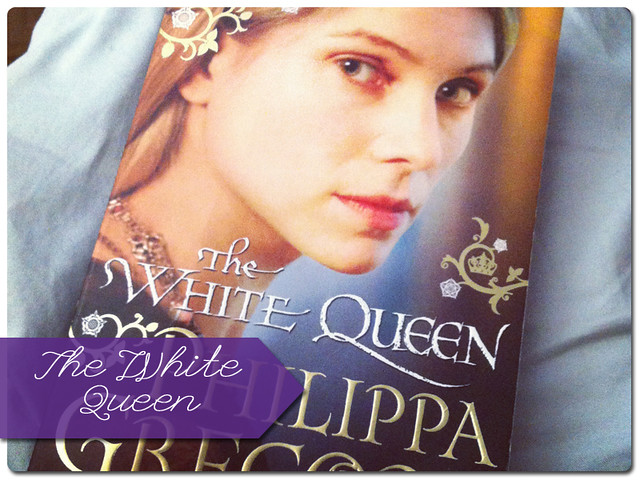
Obviously, this isn't about that White Queen, but is about the York Queen in the War of the Roses.
The White Queen follows Elizabeth Woodville, a commoner and a widow who charms the new king Edward IV into marrying her with her astounding beauty and a bit of her mothers witchcraft. The story tracks her struggles through the Wars of the Roses over the space of thirty years in which the House of York and the House of Lancaster fought over the English throne in the mid-1400's. The novel is the first in the Cousins War series by Philippa Gregory which covers both houses, with sequels featuring Margaret Beaufort, the Lancaster Queen, Elizabeth's mother Jacquetta and future titles will go on to cover her daughter Elizabeth of York and her contemporaries.
The novel is at its core a historical romance with a bit of mystery and plotting thrown in for good measure. Throughout the story there is a constant reminder of Elizabeth and Edwards love for each other and their relationship always appears strong even when they are separated.
Obviously a good chunk of content is about the actual wars that were occurring during the time period, and for me this was a particularly confusing time. Many of the characters involved have similar names, and as I said in my review of The Constant Princess I am slowly trying to read some historical fiction in order to improve my knowledge of British history (for more about why I started reading them, click here!) In case you too have issues with keeping history straight in your head or you simply aren't aware, to summarise a very long period of time, initially we had Lancasters on the throne, the Yorks took the throne, and then the Lancasters took it back, and that was the start of the Tudor period where both the Lancasters and Yorks were joined by marriage. We follow a good amount of this political shuffling through Elizabeth, even though she is a woman and away from the actual action, Gregory shows us that women often had ways of finding out what was going on around them even though they themselves were not always directly privy to that information.
During all of the hoo-ha with the swapping of the throne between houses, there was a lot of sneaky behaviour and deception going on and it is this which lead me to be so interested in this book in particular. The mysteries in this woman's life are many, she managed to rise up the ranks very suddenly and charmed both king and court completely, her mother was accused of witchcraft as she herself was, and her sons were the Princes in the Tower, one of the great unsolved mysteries of the Tower of London. Philippa Gregory isn't afraid of taking mysteries like these and turning them into a strong, gripping plot and I can honestly say that I thoroughly enjoyed reading this book.
As with the Constant Princess the book was a little hard going at the beginning because you are grappling with so many characters, but I found this story in particular much easier to grip onto than the others. There are several references to magic within the novel as Elizabeth believes herself to be descended from the water goddess Melusina. Although initially this felt like a tacked on plot device that wouldn't necessarily add to the story and instead detract from the factual parts of the tale, Gregory uses it as a tool to overcome some of the mysteries surrounding Elizabeth's life and they are relied upon fairly heavily to tell her version of the story.
The magic is portrayed as a natural born skill that is innate to the women in this line of the family and integral to the characters themselves. It isn't explained in an unnecessary way, it is simply a skill that the women of the family use when they come into hardship. The very frank use of the magic in the story actually lends itself to being more believable, and almost innocent, it doesn't actually feel like cheating at any point in the story when Elizabeth comes across a hardship and her mothers guidance helps her to embrace her ancestry and take on the waters, a metaphor for using her magical influence to sway events. Gregory has managed to use this rumour in history to develop the queen into an empowered woman who will not allow the time that she has been born into to dictate how her life should be affected.
Gregory still manages however to keep the story grounded. Her reputation for research allows her to seamlessly join together the fantastical elements and the facts, and although she has to take a stance on the mysteries surrounding the wars which could or could not be correct Gregory manages to keep the reader believing that this could have been what happened. The story sucks you in because it is so convincing. The time period was full of drama and ups and downs that lend themselves fabulously to the plot allowing for a pace that keeps you reading. In particular I loved her stance on the Prince's in the Tower, as it creates presence of mind for Elizabeths character, showing she isn't just bowing to the stronger, superior men, but is taking steps to control events.
The book had me interested in continuing to read the series with The Red Queen, The Lady of the Rivers, and The Kingmakers Daughter which is released this year. I am especially excited for The White Princess, about her daughter which is rumoured to be due for release in 2013 after a plot point is revealed towards the end of this book. It should prove interesting indeed!
★★★★

